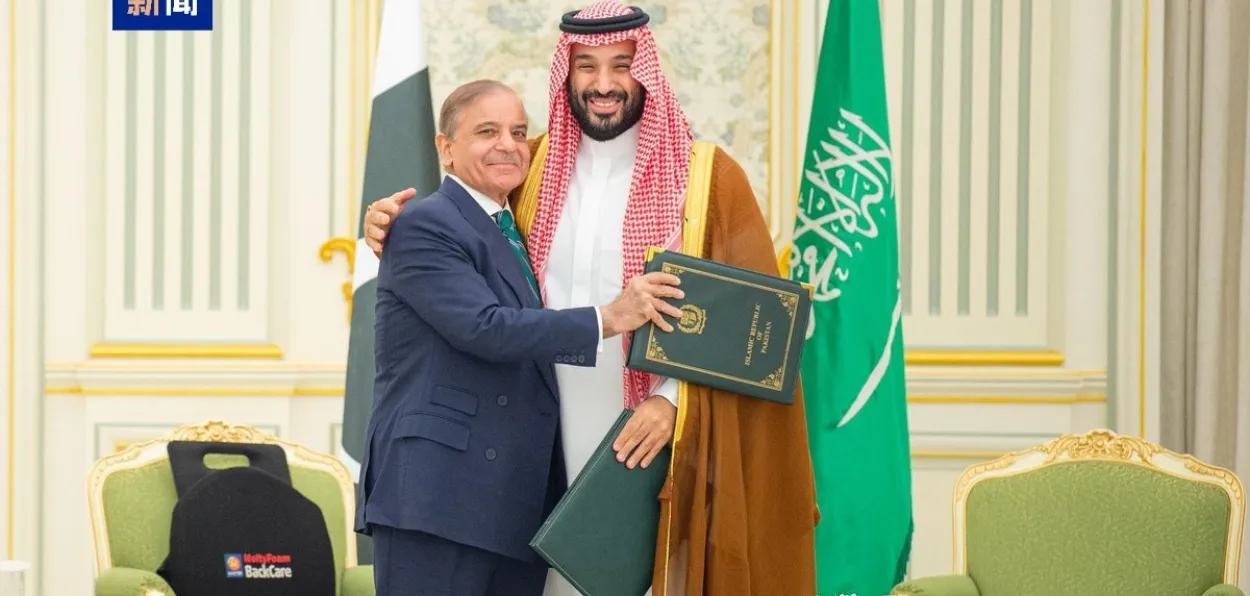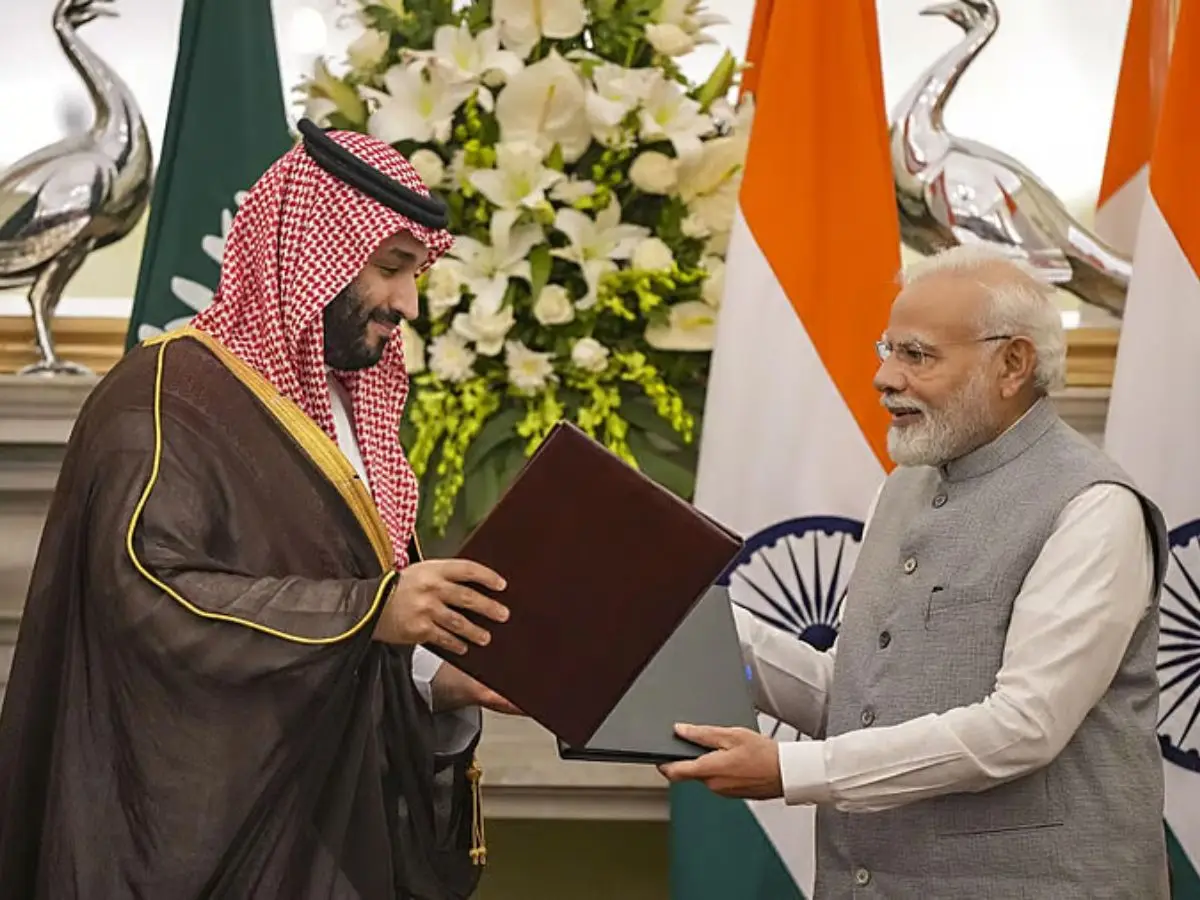
Aditi Bhaduri
The recently concluded Saudi-Pakistan defence pact has thrown the Indians into a tizzy. The Strategic Mutual Defence Agreement, signed during Pakistani Prime Minister Shehbaz Sharif’s recent visit to Riyadh, envisages the two countries treating any aggression against either as an aggression against both, enhancing joint deterrence and military cooperation.
The pact, which marks a significant upgrade in their bilateral relationship, positions Pakistan as a key regional security partner and reflects the increasing complexity of Gulf security dynamics. It comes in the wake of Israel's attacks on Qatar, which led to the convening of an extraordinary Arab-Islamic summit to discuss the attacks and rethink security in the region.
In Delhi, the Ministry of External Affairs reacted rather quickly. “We have seen reports of the signing of a strategic mutual defence pact between Saudi Arabia and Pakistan. ........We will study the implications of this development for our national security as well as for regional and global stability. The Government remains committed to protecting India’s national interests and ensuring comprehensive national security in all domains,” Randhir Jaiswal, MEA spokesperson, said.
It was an unusual reaction for the MEA to speak on other sovereign states. But India has cause for concern. The Modi government has made significant efforts and energy in upgrading and deepening India's relations with the Gulf countries, especially Saudi Arabia and the UAE. Cooperation on terrorism figures prominently in the bilateral relations, as Saudi Arabia has also been facing threats from terrorism from many sources.
In fact, Prime Minister Modi was on a visit to KSA when the Pahalgam massacre took place. The Saudis came out strongly against terrorism at that time. Today, the Saudis were concluding a pact with Pakistan - the very country that India blamed for Pahalgam. And Saudis are no strangers to Pakistan's duplicity when it came to harbouring terrorists and using terrorism as an instrument of state policy.
Saudi Prime Minister Mohammad bin Salman with Pakistani PM Shehbaz Sharif and Army chief Asim Munir
Yet, the pact itself is not unusual to surprise India. The Kingdom of Saudi Arabia and Pakistan have a long-shared cosy relationship, something that the MEA statement reflected. Their military cooperation, which began in the 1960s, saw them jointly repulse a South Yemeni incursion into Saudi Arabia's southern border in 1969. In the 1970s and 1980s, up to 15,000 Pakistani troops were stationed in the kingdom.
During the 1990-1991 Persian Gulf War, Pakistan sent troops to protect the kingdom. It continues to provide extensive training support for the Saudi military and has regularly sold small arms to the Saudis. It is widely believed that the two countries also have a nuclear understanding whereby Pakistan provides a nuclear cover for the kingdom.
During the Afghan jihad against the Soviet Union, the Saudis poured billions into Pakistan as a frontline state and became one of the three countries later on to recognise the Taliban government in Afghanistan.
According to the Saudi analyst Madawi Al Rasheed, the alliance with Pakistan helped Saudi Arabia promote Islamic identity rather than Arab nationalism.
Moreover, more recently, Pakistani security officers had helped the Bahraini royals put down the popular uprising there.
However, Pakistan refused to join Saudi Arabia's war in Yemen against the Iran-backed Houthis in 2015, and it disrupted the alliance. The then Nawaz Sharif government was keen to join the war, mainly out of personal loyalty to the Saudi royal family, but the parliament voted against it.
Prime Minister Nawaz Sharif is beholden to the Saudi royal family. After his second term as prime minister ended through a military coup in 1999 by Pervez Musharraf, he went into exile in Saudi Arabia. Moreover, Saudis have poured billions of dollars into the struggling Pakistani economy through loans, grants, and deferred payments for Saudi crude.
Pakistan's refusal to join the Saudi coalition in Yemen enraged the Saudis as well as their partners in the Yemen war, like the UAE. Ties between Saudis and Pakistanis were further strained when Imran Khan’s government drew closer to Turkey, Qatar, and Malaysia, and it floated the idea of a new Islamic forum, parallel to the Organisation of Islamic Conference (OIC). However, once the Sharifs took over, they moved away from the new grouping and tried instead to mend fences with KSA. This pact, thus, should be seen as the culmination of a long and wide-ranging cooperation.
Secondly, soon after the pact was signed, a senior Saudi official told Reuters that "This agreement is a culmination of years of discussions. This is not a response to specific countries or specific events but an institutionalisation of longstanding and deep cooperation between our two countries." He went on to acknowledge the need to balance relations with India, saying, "Our relationship with India is more robust than it has ever been. We will continue to grow this relationship and seek to contribute to regional peace in whichever way we can."
 PM Narendra Modi and Saudi Arabian Prime Minister Mohammad bin Salman in New Delhi
PM Narendra Modi and Saudi Arabian Prime Minister Mohammad bin Salman in New Delhi
Third, it is difficult to envisage the Saudis entering into armed conflict with any nation simply to protect Pakistan, though it may be a hedge for Pakistan from any future attacks by India. The very fact that India and Saudi Arabia today share robust relations is because India is everything Pakistan is not. It is a stable democracy with the fastest-growing and the world's fourth-largest economy.
With the Saudis preparing for a post-oil economy, India has been a promising place for Saudi investments. The Saudis have committed to investing $100 billion in India. At least 40 Indian companies have established headquarters in Saudi Arabia. Besides, India is one of the major Saudi energy importer.
Saudi Arabia and India have also entered a defence partnership where they regularly conduct joint military exercises. Recently, Indian Naval warships INS Tamal and INS Surat concluded their port call at Jeddah and participated in a Passage Exercise with RSNF Corvette HMS Jizan. The Saudis would not want to jeopardise this relationship, certainly not for Pakistan.
Fourth, Pakistan and its role in fomenting terror and religious radicalisation not only in India or South Asia but across the region is not lost on the Saudis, who have deported many such wanted men like Abu Jundal to India. After the Arab Spring, which directly threatened regimes in the Gulf, and with attacks by ISIS directly on Saudi territory, the Saudis today have zero tolerance for terror.
The pact, therefore, seems to be directed more at any external aggression against Saudi Arabia, which could emanate from Iran through the Houthis, Syria where a former Al Qaeda chief is holding the reins of power now, backed by Turkey and Qatar, with both of whom the Saudis share a complicated relationship, and to a lesser extent from Israel, as well as against non-state actors like Al Qaeda in the Arabian Peninsula and ISIS.
Finally, the Saudi-Pakistan defence pact is also a huge hedge for the ruling House of Saud, which has a large youth population, unlike other Gulf countries. Saudi Arabia is the highest chances of Gen Z uprising in the region. Pakistan, which had performed policing duties for the kingdom and had clamped down on a Palestinian uprising inside Jordan with brute force in the 1970s on behalf of the royal family, would be useful to quell any such uprising.
The defence pact will give Saudi Arabia additional leverage over Pakistan and may actually be good for India. On the other hand, it will give Pakistan some breathing space as it navigates a path where it is drawing closer to the US, while major Chinese investments in the China-Pakistan Economic Corridor (CPEC) are being jeopardised by increasing terror attacks on them, with Pakistan unable to stop them.
ALSO READ: MWL's Charter of Makkah could steer world through conflicts
Hence, the Agreement between Saudi Arabia and Pakistan seems to be more about shoring up Saudi security and less about Pakistan-India rivalry. India definitely has to remain vigilant, but should also reflect on how to turn the pact to its advantage, as the pact gives extreme leverage to the Saudis over Pakistan.
(The writer is an award-winning journalist, specialising in Eurasian and West Asian politics)
